How To Clean Purge Solenoid Valve
♥ Sharing is caring ♥
Contents
DISCLAIMER: AS AN AMAZON ASSOCIATE I EARN FROM QUALIFYING PURCHASES. THIS POST CONTAINS AFFILIATE LINKS THAT WILL REWARD ME MONETARILY OR OTHERWISE WHEN YOU USE THEM TO MAKE QUALIFYING PURCHASES. FOR MORE INFORMATION, PLEASE READ MY EARNINGS DISCLAIMER. LINKS TO ANY PRODUCT OR SERVICE REPRESENT OUR HONEST OPINION OF WHAT WE THINK WILL SOLVE THE PROBLEM BEST. WE REALLY CARE ABOUT YOU AND ONLY DO THIS BECAUSE IT DOES NOT AFFECT YOUR PRICES. HOPING YOU DON’T MIND AND WE CAN CONTINUE GIVING YOU GREAT CONTENT!Cleaning purge solenoid valve can be done in two different ways and which one you pick depends on how much technical knowledge you have. Since our main objective is to get rid of the dirt that does not let it work properly, just rinsing internal components without opening should get the job done for most people.If you have a broken casing or a faulty solenoid, there isn’t much that you can do and you will have to replace the purge solenoid valve. However, if you tested the solenoid’s coil, and you don’t see any damage in the housing, you can try to clean the valve and in many cases it will start working again, saving you some money.Reading: how to clean purge solenoid valveThe purge solenoid valve is a simple device; it consists basically of three main parts:
There are three main problems that a purge solenoid valve may have:
- The casing (including the inlet and outlet pipes) could be cracked, allowing the fuel fumes to escape and, most of the time, generating a vacuum leak.
- The solenoid’s coil could be cut or damaged, preventing it from moving the plunger or flap properly.
- The most common problem occurs due to debris or carbon build-up, the inner electromechanical part sticks, preventing the purge solenoid valve from fully open or close. Sometimes it can get stuck in a fixed position and it won’t move at all.
Cleaning the solenoid purge valve will get rid of this debris and this is how we do it:
Cleaning your purge solenoid valve without opening itThe step-by-step process of cleaning without opening the valve:
Step #1
Spray a good amount of carb cleaner or MAF cleaner into both tubes of the purge solenoid valve.
Step #2
Cover both ends with your fingers and shake well. Leave both ends covered and wait several minutes for the cleaner to lose dirt.
Step #3
Uncover the valve’s tubes and let the liquid drain out. It should be dark, with signs of dirt, charcoal, and debris. Repeat steps “1” and “2” as many times as necessary. The ideal thing would be that you do it until the liquid leaves the valve clean.If the liquid came clean the first time, it’s probably because your purge solenoid valve isn’t clogged by dirt or debris and dirt is unlikely to be the problem. You may want to keep doing this anyway; it’s not going to do any harm to your valve.
Step #4
Spray contact cleaner in the valve’s connector and the car switch.
Step #5
Let everything dry.Opening and deep cleaning your purge solenoid valvePurge solenoid valves are not meant to be opened. You are going to manage to open it using a small flat blade screwdriver and something sharp like a small knife to force the case open.
Step #1
Most purge solenoid valves like the Bosch type (that you can find in many car models) have their two halves glued together. What you have to do is (with the help of the small flat blade screwdriver), try to remove as much glue as you can.Once you notice that you have removed some good amount of glue, try to firmly but carefully tear both ends of the casing apart.
Step #2
Now that you have the two halves split, you are going to have a small rounded piece, like a cap. The other half contains all the working parts, the solenoid, the valve’s electrical connectors, etc.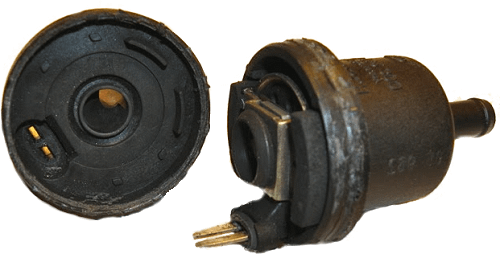
Step #3
Check the status of the o-rings and the rubber parts. For now, these parts are not sold separately. It would be great if they were sold as a repair kit. It isn’t much you can do about this.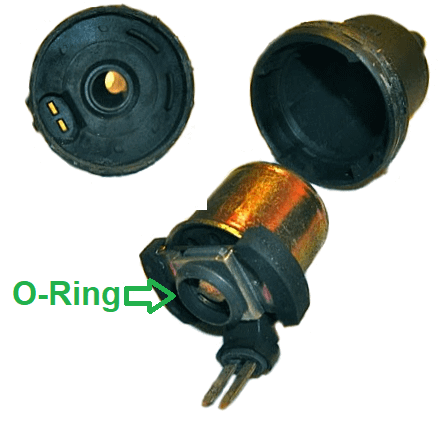
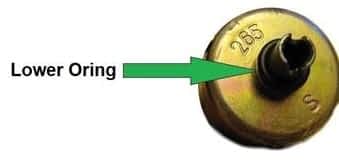
Step #4
Spray the inner part of the solenoid as is shown in the picture: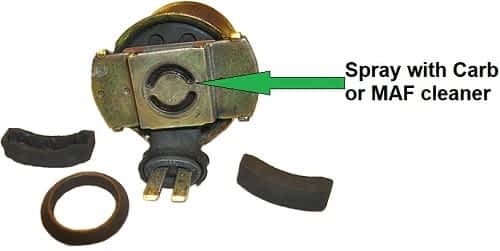
Step #5
Once everything is cleaned and sealed, it’s time to put everything back together. Reseal the case together with Epoxy glue or RTV rubber.Keep in mind that once you have sealed your purge solenoid valve with these products it can be very hard to open it again. Make sure that everything is well put together before you glue the two halves back.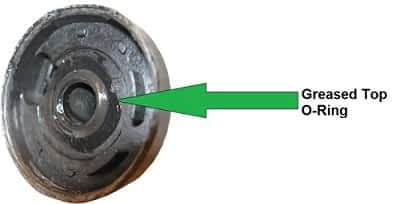
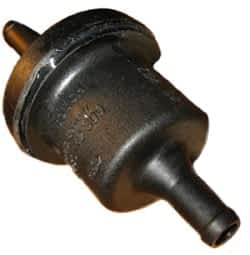
Clear the fault codes
It would be ideal to have a scanner to clear the fault codes stored in your engine’s computer and to turn off the “check engine” light from your dashboard. If you don’t have access to a scan tool don’t worry; the “check engine light” will stay on, but if the problem is fixed and it will turn off after a few driving cycles.You should feel that your car is running better and you will hear the typical clicking of the solenoid being opened and closed while the engine is idling and warm. If your valve didn’t get fixed without opening, you may want to try the steps indicated in section “Opening and deep cleaning”.Here is an infographic with more details for your reference .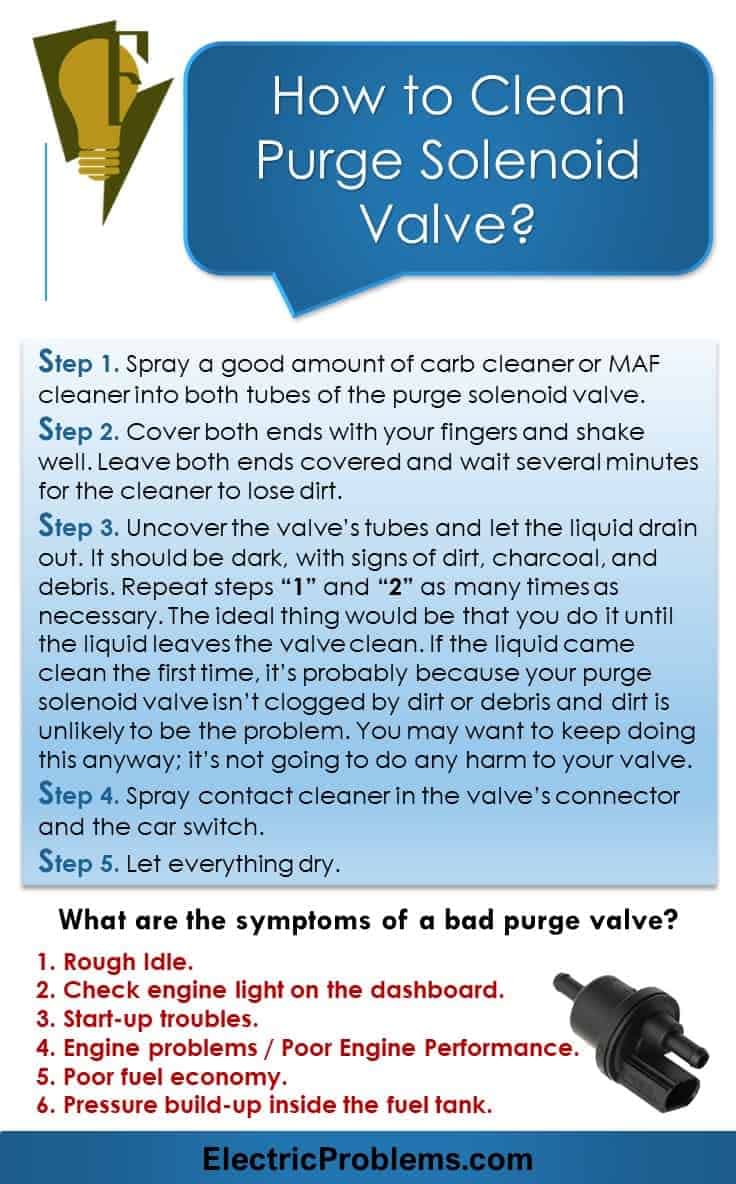
Symptom #1. Rough Idle
If the canister purge solenoid valve sticks open, it will create a vacuum leak that will make the engine run rough when idling or when the vehicle is driven at low speeds. If the vacuum leak is too big, the engine could stall at all times, not just at low RPMs.
Symptom #2. Check engine light on the dashboard
If the ECU detects a malfunction in the EVAP system it will light up. There are several trouble codes that can turn this light ON; but there are specific codes that refer to EVAP system errors, the purge solenoid circuit, or signal.
Symptom #3. Start-up troubles
Another common symptom of a bad purge solenoid is that the engine can have start-up issues; it can be difficult to be started up. This is mostly a consequence of the vacuum leak caused by the failure of the purge solenoid.This leak allows unmeasured air to enter the engine, which alters the air-fuel ratio required by an engine to start properly.
Symptom #4. Engine problems / Poor Engine Performance
A failing canister purge solenoid valve may cause an engine to lose power and lead to slow acceleration.
Symptom #5. Poor fuel economy
A bad canister purge solenoid valve can cause a vehicle to have poor gas mileage. This happens because the EVAP will be venting fuel vapors that were meant to be burnt by the engine.Read more: how to tell if a leo woman likes you | Top Q&AThe fuel will escape to the atmosphere instead of being used by the engine, which will cause the engine to be less fuel-efficient.
Symptom #6. Pressure build-up inside the fuel tank
When a canister purge solenoid valve is stuck closed it may cause a restriction in the fuel system that could lead to high pressure accumulating inside the fuel tank.Can you buy a purge solenoid valve online?Yes, you can buy it from Amazon for select models. Here are some for GM:Some for Ford/Lincoln models:And here are for Dodge/Chrysler models:In conclusion…Since the mid-1960’s many authorities from different countries have become aware of the negative impact that vehicle’s internal combustion engine emissions have on the atmosphere.Pollution was a major concern, and by that time, there were none or poor regulations to enforce vehicle manufacturers to design more eco-friendly engines. Agencies like EPA in the USA started to take care of this matter and many devices were implemented on engines to help them reduce their emissions.One of these devices is the “Evaporative Emission Control System”, (EVAP). The main goal of the EVAP system is to reduce the evaporative emissions of gasoline vapors caused by vehicles’ fuel systems.Before the invention of this device, fuel systems weren’t sealed, resulting in fuel vapors venting straight into the atmosphere. EVAP system is pretty simple: the fuel vapors are conducted to a canister containing an activated carbon filter.Once the fumes have been filtered, they go back to the engine to be burned. The purge solenoid valve (also referred to as canister purge solenoid), is one of the main components of the “Evaporative Emission Control System”, (EVAP).This valve is controlled by the engine computer and functions as a switch, enabling or disabling the flow of the gases filtered to the engine by the canister. When the engine is OFF, this valve is closed, and when the engine is running and has reached its operational temperature, the Engine Control Unit (ECU) gradually opens the purge valve to allow the fuel vapors to flow towards the engine.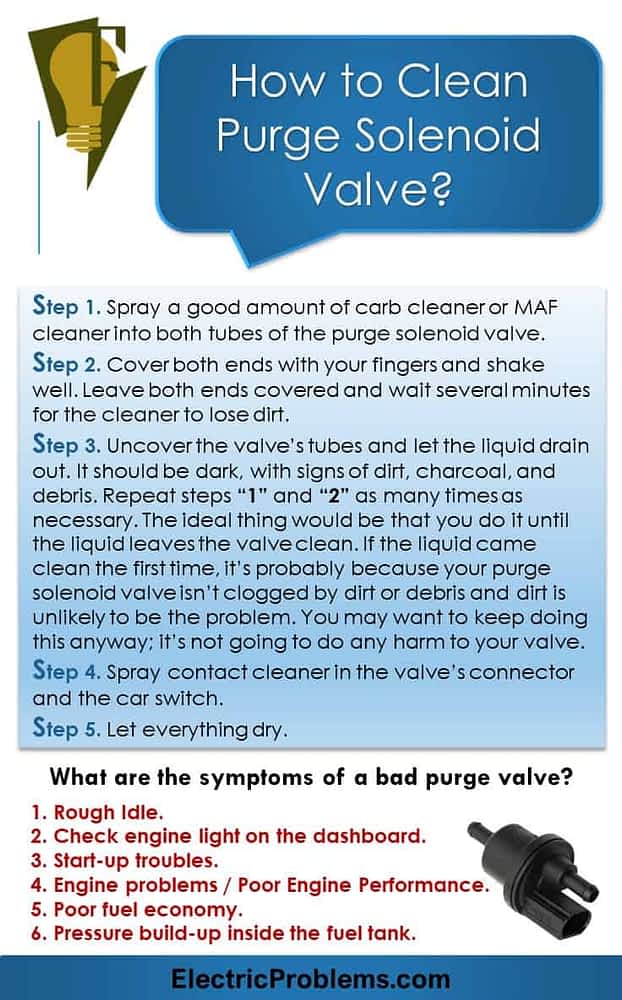
At your service, AUTHOR
 David Castillo
David Castillo
David Castillo has been working in the Automotive Industry for 20 years.He is the founder and owner of Arkoracing Argentina, a well-known car repair garage and tuning shop based in Buenos Aires City. He has made his business grow based on a policy of professionalism, commitment to the customer, and continuous learning.David is a car fanatic himself and he has been working on cars since he was in 7th grade, inspired by his father, who is an Electro-Mechanical Engineer. He built several cars that ran successfully in his Country drag racing circuit and is currently working on a brand new car to be raced in the 2021 season.He has a degree in Electronics, and he took several courses on stand-alone fuel management systems, among other courses.David enjoys racing cars, playing tennis, and running in his free time, and he is always on the lookout for new and interesting innovations to improve his business.Facebook @arkoracingfan Instagram @arkoracing
Related Posts:Are you ready for more solutions? Let’s take care of problems and finally enjoy 
Legal Information: Affiliate Disclosure. Even though we recommend products that we like, some of them are linked to our affiliate partners that will pay us a small commission at NO cost to you!Accuracy Disclaimer. The information contained in this website is meant to be as accurate and current as possible, but mistakes happen (you should always visit manufacturer’s website for exact details and the latest updates). This information was collected from a variety of sources and is subject to change without notice. topqa.info assumes no responsibility and disclaims any liability for anyone’s use of the information provided.Safety Disclaimer. This article is for informational purposes only and is not intended to replace professional advice in any way. You assume full responsibility for the use of information provided (whether it’s in text, video, or image format) and you will not hold liable topqa.info and its employees (or writers and editors) for injury, death, or equipment damages as a result. You are using the information provided at your own risk which includes, but is not limited to, maintenance or repair, operation, installation, and safety precautions.Read more: how to score a 180 on the lsat
Last, Wallx.net sent you details about the topic “How To Clean Purge Solenoid Valve❤️️”.Hope with useful information that the article “How To Clean Purge Solenoid Valve” It will help readers to be more interested in “How To Clean Purge Solenoid Valve [ ❤️️❤️️ ]”.
Posts “How To Clean Purge Solenoid Valve” posted by on 2021-09-16 03:13:08. Thank you for reading the article at wallx.net
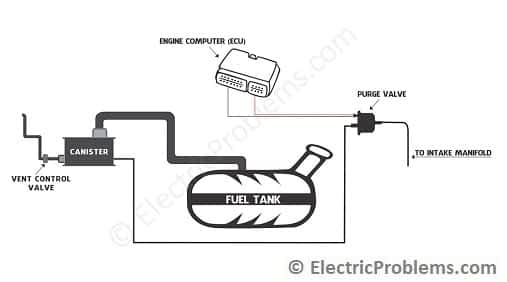
 David Castillo
David Castillo 





